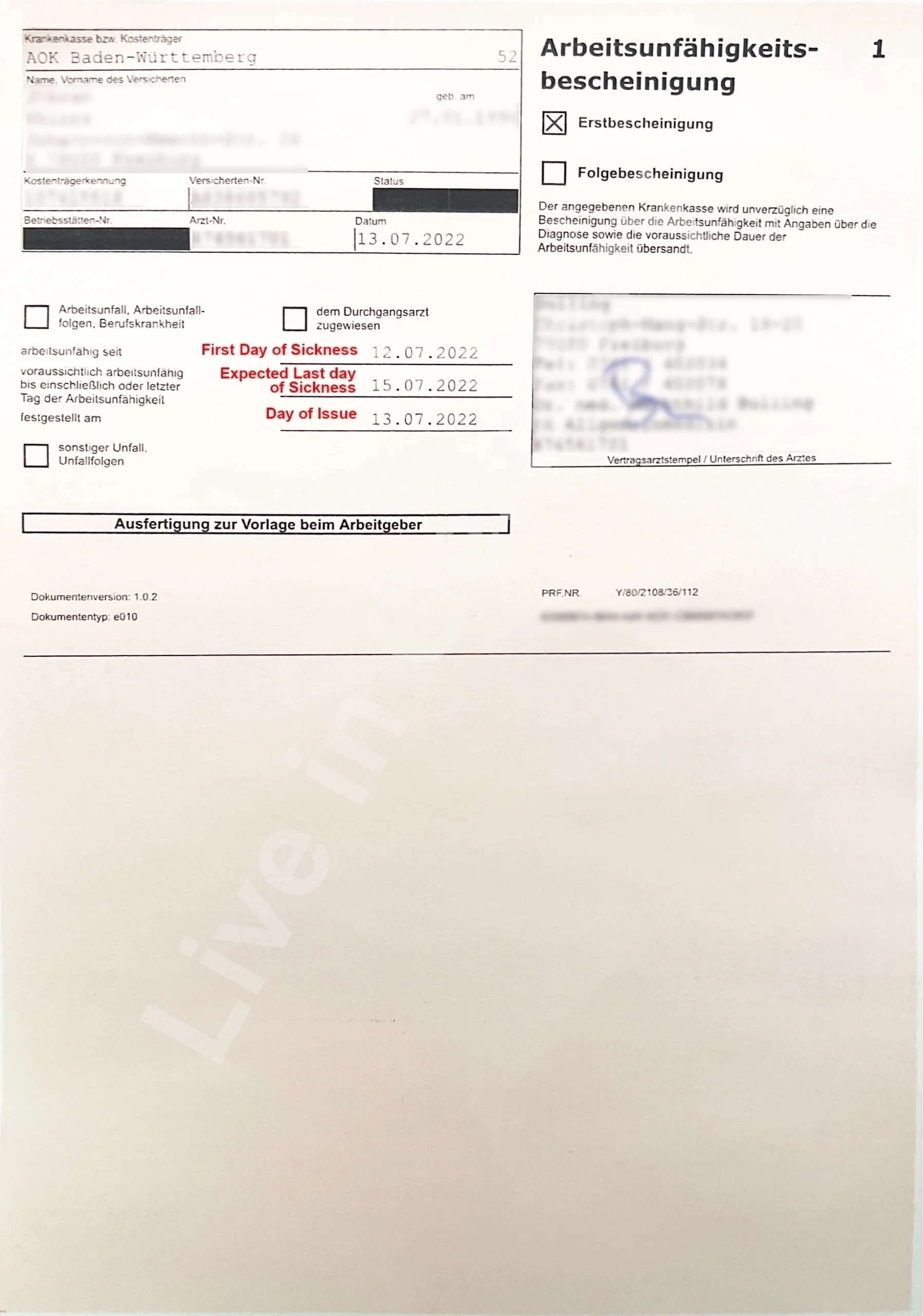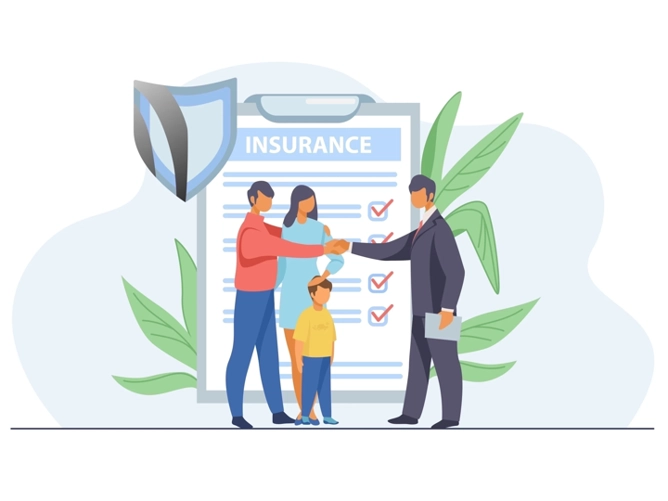
How To Take Sick Leave in Germany [2026 Guide] - Live In Germany
Are you curious about the German sick leave system? Do you want to know everything there is to know about it? If so, read on! In this post, we’ll take you through the basics of German sick leave system, including how long employees can take off, what types of illnesses are covered, and more. We also include rules that summarize the different benefits and drawbacks of taking German sick leave. So, if you want to learn more about this important topic, read on!
How to Inform your Employer about Sick Leave in Germany?
In Germany, if you take a sick leave for more than 3 consecutive days then you need to provide your employer the unable to work certificate (Arbeitsunfähigkeitsbescheinigung) from your doctor. Then when you go back to work after your sick leave, then you must provide a medical note from your doctor.
However, depending on the company, the policies may vary. Some companies require doctor certificate after the 4 consecutive sick days. As we said it depends on the company so it is advisable that your on the first day of sick leave, go to the doctor and get a Arbeitsunfähigkeitsbescheinigung so if your employer needs this certificate after the first day of sick leave then you can submit this document when required. If you started in a new company so it is best to ask such things in advance so you are in compliance with the policy.
Steps to Follow While Taking Sick leave in Germany
Step 1: Inform Your Employer
If you are unable to work, you must notify your employer right away. The best approach would be to ask your supervisor or the Human Resources (HR) department what should be the best way to inform them about your sick notice (Krankmeldung).
There is no one type of communication that is appropriate; call, email, or text might all be used. In your first months at work, you ask your supervisor about the preferred method.
Step 2: Go To A Doctor
If you think that your illness will last more than 1 or 2 days then it is recommended to you call your House Doctor and get an appointment. After visiting him or her, be sure to take a sick note for your employer.
Step 3: Send A Sick Note To Employer And Health Insurance
The yellow note (Gelber Schein) is also known as the sick note (Arbeitsunfähigkeitsbescheinigung), since it is yellow or sick. There are three versions available. One for your health coverage, one for your employer, and one for your records. The first two don’t specify the diagnosis, while the second specifies it. ‘Ausfertigung zur Vorlage bei der Krankenkasse’ will appear in large characters on the health insurance form, and ‘Ausfertigung zur Vorlage beim Arbeitgeber’ will appear on the employer form.
Reasons for Sick Leave in Germany
In Germany, there are many different reasons for taking sick leave, including your physical and mental well-being as well as the health of your children.
Moreover, there are a few differences between sick leave. Short-term and long-term leave are the legal terms for it. Physical or mental severe illnesses are covered under long-term sick leave, whereas your physical fitness to labor and minor illness are covered under short-term sick leave.
What does a Sick Note Look like?
You should let your doctor know that you require a sick note when you go to see him/her. The doctor determines how many days you will be unable to work before you recover based on your diagnosis. There are three sections to the sick note:
- Your health insurance is covered on a page. It will be delivered to your insurance company directly by your doctor’s office.
- Only the length of your sick leave, not the nature, is shown on the second page; thus your employer cannot find out what kind of sickness you have and has no right to inquire about it. You must now deliver or send this form to your employer, but it will be done automatically and immediately in the future.
- Your personal records are kept on the third page.

Do I Always Need a Sick Note?
Jaein (Yes \& No), It depends on the number of Sick days and Company policy. Some companies have this policy where you need to submit the Sick Note from your doctor from the 3rd or 4th day of Sickness. Keep in mind if you fell ill on Friday then the Weekend is also counted toward your Sick days.
Usually, obtaining a sick certificate is recommended, even if you believe you’ll be unwell for only one or two days. As you don’t need, maybe your illness will get worst on the third day or maybe longer. Then it is always good to have a proof that you were actually ill and you have already been to the doctor.
As we mentioned, according to your work contract, you’re required to provide a sick note to your employer when your sickness lasts for more than three days. It’s also a good idea to speak with your employer about whether or not, you’ll need a sick note after one day of leave.
Does Germany have Paid Sick Leave?
The answer is YES, paid sick leave is available to you as a German employee. During your sick leave, you will get a full salary by your employer. This is due to Continued Remuneration (Entgeldfortzahlung), which means that if you are unable to work for six weeks then your employer is bounded by law that he will pay you in full.
Keep one thing in mind that your employer, does not have to continue paying you if you get sick within the first four weeks of starting a new job with a new company. You may apply for sick pay from your government-funded health insurance in this scenario.
Publicly insured workers have the right to receive sick pay (Krankengeld) if they are out sick for more than six weeks due to the same illness. Over a period of 72 weeks, you may get Krankengeld. Whether you’re suffering from physical or mental sickness, it makes little difference.
Can you Claim Sick Pay, if you are Privately Insured?
You cannot claim sick pay if you are privately insured; instead, if it is part of your tariff, you can claim your daily sickness allowance (Krankentagegeld). As part of their tariffs, Ottonova, a German-language Private health Insurance provider, provides a daily sickness allowance.
You’ll have to cover financial losses caused by your sickness yourself if you’re self-employed or a freelancer. It’s even more crucial for you to get a tariff with a daily sickness benefit if you’re privately insured.
How Much Does a Worker Receive For Sick Paid Leave in Germany?
Depending on your situation and pay, you may be entitled to receive a certain amount of sick pay. It’s usually 70% of your gross monthly pay or 90% of your net monthly pay, whichever is lower.
Unemployment benefits, long-term care, and pension benefits will continue to be deducted from your sick pay. Using this calculator, you may calculate how much money you would get for being sick.
But, each day of 112,88 euros gross results in 3.386 euros gross per month, which is the maximum amount of Krankengeld allowed. It doesn’t matter if you salary increasing every moth, the maximum sick pay your can is 2,979.99 euros per month in 2022 after deducting your social contributions. You can calculate your Sick Pay: HERE
Can you work on Another Job during Sick leave?
Employees are strictly forbidden from doing any paid work in contrast to traveling or shopping on sick leave. You might be considering returning to work or working on a side hustle.
You may, however, work earlier than the prescription from the doctor recommends if you choose. In most situations, you’ll be taken to the doctor for a new sick note with shorter dates by your employer.
In other words, if you’re feeling better, you may return to work sooner, but there is no requirement to begin working sooner than the note’s scheduled end date. People may also take sick days and work somewhere else in order to get better.
It is illegal in Germany to do this. This might result in a harmed relationship with management, distrust in the firm, or termination without notice. The possible repercussions are varied.
How Many Sick Days Can an Employer Expect to Take Each Year?
Your employer must accept up to 30 sick days per year, as per one of Germany’s most powerful worker unions. Any extended sickness leave, particularly if it recurs year after year, may be deemed excessive. This might be a legitimate reason to get fired.
Requirements for Sickness Benefit
You must satisfy the following requirements in order to apply for sickness benefit:
- You’re working for a government-run health insurance plan that you contribute to.
- You have a work permit in Germany if you have a current residence permit (if applicable).
- If you employer has stopped paying you or you have been sick for more than 6 weeks,
- Your doctor has issued a certificate indicating that you are unfit to work.
- If asked, you agree to a medical exam.
If you are eligible for the Sickness Benefit (Krankengeld) mostly depends on the policy of your German Private health insurance provider. If you are confuse in this matter then it is recommended to contact your insurance provider and clear these things up.
How to Apply For Sickness Benefits (Krankengeld) in Germany?
Your Unable to work certificate (Arbeitsunfähigkeitsbescheinigung – AU – often known as a Gelber Schein after the yellow paper form) must be presented to your health insurance provider. Usually when you go to the doctor. then after your consultation, your doctor will normally submit this to your health insurance provider electronically.
On the other hand, a copy of your certificate will need to be sent to your employer. Most employers accept the copy via email and then when you go to work after your sickness then you can hand in the original paper yourself. If your employer said that he needs the original certificate then you need to send him via post.
Your insurance provider will write to you after receiving your question, informing you whether or not you are entitled to sickness coverage and, if so, how to proceed. You may be able to apply for unemployment or long-term care benefits if you are not eligible for sickness benefits.
Conclusion
In total, you can take 30 sick leaves per year but if you make this a habit or in other words if you take sick leave without being sick. In this case, you could get fired due to this reason. In this guide covers all the important info needed to take a sick leave in Germany. From the applying steps to the sickness benefit in Germany. Moreover we also mentioned some of the most asked questions related to it.

Jibran Shahid
Hi, I am Jibran, your fellow expat living in Germany since 2014. With over 10 years of personal and professional experience navigating life as a foreigner, I am dedicated to providing well-researched and practical guides to help you settle and thrive in Germany. Whether you are looking for advice on bureaucracy, accommodation, jobs, or cultural integration, I have got you covered with tips and insights tailored specifically for expats. Join me on my journey as I share valuable information to make your life in Germany easier and more enjoyable.


![Best Apps to Learn German [Free + Paid]](https://liveingermany.de/images/best-app-to-learn-german/best-top-free-and-paid-learn-german-app-with-pros-and-cons.svg.webp-668w.webp)


